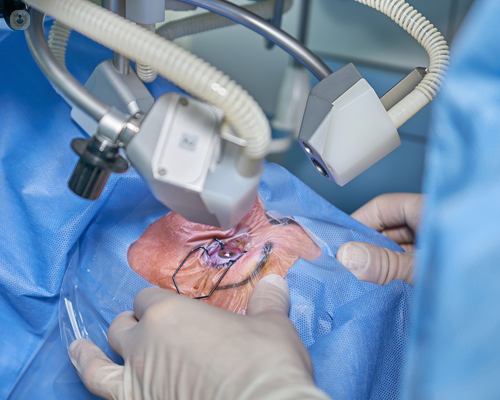Understanding cataract surgery
Autore:Cataracts are a common eye condition that can affect anyone, regardless of age. While there is an abundance of information available on the internet, it's essential to have a clear understanding of cataract surgery to make informed decisions about your eye health.
In this article, leading consultant ophthalmic surgeon Dr Naing Latt Tint answers some key questions related to cataract surgery, offering insights that go beyond the basics.

What are cataracts, and how do they develop?
Cataracts are a clouding of the eye's natural lens, which is normally clear. This clouding can occur for various reasons, including:
- age;
- genetics;
- eye injuries, or;
- medical conditions like diabetes.
Over time, the cloudiness progresses, leading to blurred vision and difficulty seeing clearly. Cataracts can ultimately impact your daily life, making everyday activities challenging.
When should I consider cataract surgery?
Cataract surgery is typically recommended when your vision problems significantly affect your quality of life. This decision is highly individualised and may depend on factors such as the degree of visual impairment, how it affects your daily activities, and your overall health. Your ophthalmologist will assess your specific case to determine if surgery is the right option for you.
Can you explain the cataract surgery procedure?
Cataract surgery is a safe and commonly performed surgical procedure. During surgery, the cloudy lens is removed and replaced with an artificial intraocular lens (IOL). The procedure is usually done on an outpatient basis, and patients often experience minimal discomfort. Advances in technology have led to various surgical techniques, including phacoemulsification, a minimally invasive procedure that enhances recovery and reduces post-operative discomfort.
What are the different types of intraocular lenses (IOLs), and how do I choose the right one?
There are several types of IOLs available, each with its own advantages. Monofocal IOLs offer clear vision at a single distance, usually for distance vision. Multifocal IOLs can provide clear vision at multiple distances, reducing the need for glasses. Toric IOLs are designed to correct astigmatism. Your surgeon will help you select the IOL that best suits your visual needs and lifestyle.
What is the recovery process like after cataract surgery?
The recovery period for cataract surgery is relatively short. Most patients experience improved vision within a day or two. It's common to have some mild discomfort, but this usually subsides quickly. You will need to use prescription eye drops to aid in the healing process. Following surgery, it's crucial to attend follow-up appointments with your ophthalmologist to monitor your progress.
Are there any recent advancements in cataract surgery that patients should be aware of?
Advancements in cataract surgery continue to enhance outcomes and patient comfort. One exciting development is the use of femtosecond laser technology. This advanced technique allows for precise incisions and a more predictable outcome. Additionally, artificial intelligence is being used to assist in preoperative measurements and IOL calculations, improving the accuracy of visual outcomes.
What are the potential complications or risks associated with cataract surgery?
While cataract surgery is generally safe, there are some potential risks. These include:
- infection;
- inflammation;
- bleeding, and;
- retinal detachment.
However, the occurrence of such complications is rare. Your ophthalmologist will discuss these risks with you during the consultation and take steps to minimise them.
How can I prepare for cataract surgery, and what should I expect on the day of the procedure?
Preparing for cataract surgery involves a few essential steps. You may need to stop taking certain medications, and your surgeon will give you guidelines on fasting. On the day of the procedure, plan for someone to drive you home, as your vision may be temporarily affected. Follow your surgeon's pre-operative instructions carefully to ensure a smooth experience.
If you’re looking for expert cataract surgery, arrange an appointment with Dr Tint via his Top Doctors profile.


